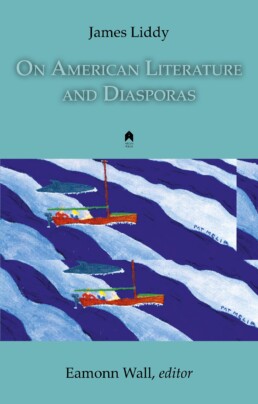
Eamonn Wall
On American Literature And Diasporas
ISBN:
9781851320448
On American Literature and Diasporas is the first of two volumes of James Liddy’s critical essays. In addition to providing unique insights into the work of American writers and Irish writers overseas, On American Literature and Diasporas includes first-hand accounts of meeting many of the canonical figures of contemporary American poetry: Anne Sexton, James Wright, William Stafford, Allen Ginsberg, Gregory Corso, and others. Throughout, Liddy engages with both the writers and their work and with the literary traditions from which they emerged. Not only does On American Literature and Diasporas provide a first-hand literary account but it also lets us know what it felt like to live in America between 1967–2008. It is a book of literary-academic-and bohemian witness written in an engaging, brilliant, and unique voice.
James Liddy arrived in the United States on 11 September 1967 to take up a one-year visiting professor position at San Francisco State University and, with some minor breaks, continued teaching Irish and Irish-American Literature, Creative Writing and Beat Literature in various American Universities until his death in 2008. The greater part of his academic life was spent at the University of Wisconsin-Milwaukee where he began teaching in 1976. Throughout his American career, James Liddy made frequent visits to Ireland and maintained a visible presence on the Irish literary scene as a member of Aosdána and as a frequent contributor to Irish journals and newspapers including The Irish Times. Best-known as a poet, his books were published by Dolmen Press, Salmon Poetry, Arlen House, amongst others.
Eamonn Wall is a Professor of English and International Studies at the University of Missouri-St. Louis. A native of Co. Wexford, he has lived in the USA since 1982. His most recent books are Writing the Irish West: Ecologies and Traditions (University of Notre Dame Press, 2011) and Sailing Lake Mareotis (Salmon Poetry, 2011).
James Liddy (1934–2008), a unique voice in Irish writing, was the author of many collections of poetry including In a Blue Smoke, Blue Mountain, Corca Bascinn, Wexford and Arcady and It Swings from Side to Side. He also published fiction and criticism and was a frequent reviewer of poetry in Ireland and the United States.
James Liddy was born in Lower Pembroke Street, Dublin, in 1934. His parents hailed from the cities of Limerick and New York. He lived in Coolgreany, Co. Wexford, intermittently from 1941 to 2000. His books include In a Blue Smoke (Dolmen, 1964), Blue Mountain (Dolmen, 1968), A Munster Song of Love and War (White Rabbit, 1971), Baudelaire’s Bar Flowers (Capra/White Rabbit, 1975), Corca Bascinn (Dolmen, 1977), Collected Poems (Creighton UP, 1994), Gold Set Dancing (Salmon, 2000), and from Arlen House, I Only Know that I Love Strength in My Friends and Greatness (2003), On the Raft with Fr. Roseliep (2006), Wexford and Arcady (2008), Askeaton Sequence (2008), Fest City (2010), It Swings from Side to Side (2011), Rome That Heavenly Country (2011) and Selected Poems, edited by John Redmond (2011). He was a Professor in the English Department at the University of Wisconsin-Milwaukee for many years, where he taught creative writing and Irish and Beat literature. James Liddy: A Critical Study by Brian Arkins was published by Arlen House in 2001 and the widely acclaimed Honeysuckle, Honeyjuice: A Tribute to James Liddy,edited by Michael S. Begnal, appeared in 2006. The first volume of his memoir, The Doctor’s House: An Autobiography was published by Salmon in 2004, with volume two, The Full Shilling, appearing in 2009. James Liddy passed away on 5 November 2008 following a short illness.
To suggest that Liddy is a good critic because he is a good poet tells only part of the truth. Of course lessons learned from the practice of writing helped him understand and read literature uniquely; however, Liddy’s gifts as a critic are also the result of a lifetime of intense reading and deep thought that add depth, nuance and moral compass to his criticism.
– Eamonn Wall
